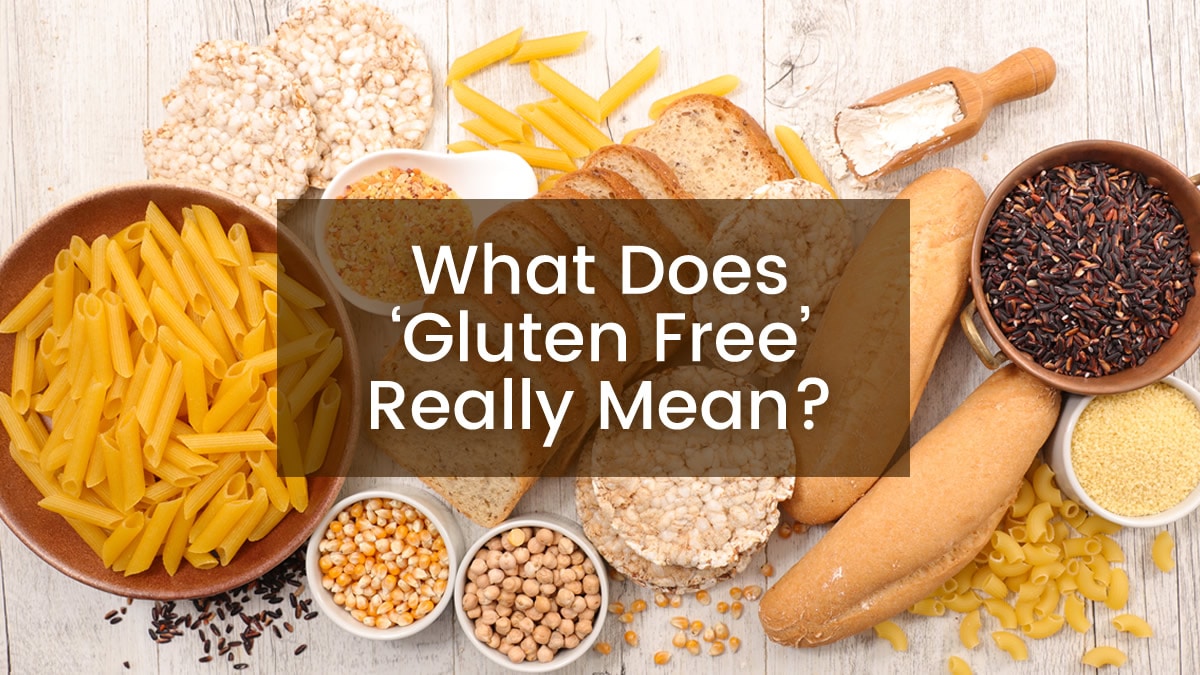Gluten-free foods are a hot commodity in today’s society. You may be wondering if you should hop on this diet trend.
But is a gluten-free diet as healthy as the food industry makes it out to be?
Keep reading to learn all about gluten and if a gluten-free diet is right for you.
What Is Gluten?
Gluten is a group of proteins found in the following grains: wheat, barley, rye, and triticale (a hybrid of wheat and rye). It helps foods hold their shape by forming a glue-like substance.

Foods With Gluten
Gluten is present in all food products that use wheat, barley, rye, and triticale flours. This means that bread, crackers, pasta, bagels, wraps, breakfast cereals, and baked goods often contain gluten.
Other lesser-known foods with gluten may include:
- Condiments
- Soy sauce
- Cream sauces
- Ketchup
- Malt vinegar
- Barbecue sauce
- Beverages
- Beer
- Malted milkshakes
- Coffee creamer
- Soups
- Food coloring
- Chips
- Granola bars
- Candy
- Veggie burgers
- Hot dogs
- Ice cream
- Fried foods
- French fries
- Fried chicken
- Fried fish
- Mozzarella sticks
In some cases, naturally, gluten-free foods may contain traces of gluten due to cross-contamination. For example, oats can be contaminated if grown alongside wheat or processed on the same machinery.
What Is a Gluten-Free Diet?
A gluten-free diet is a diet that eliminates all foods with gluten. It includes only gluten-free foods such as:
- Gluten-free whole grains
- Quinoa
- Buckwheat
- Sorghum
- Rice
- Alternative flours
- Almond flour
- Chickpea flour
- Coconut flour
- Fruits
- Vegetables
- Legumes
- Nuts
- Seeds
- Eggs
- Fresh meat and fish
- Dairy products
Many manufacturers label packaged foods as “gluten-free” per the FDA’s regulation, making identifying gluten-free foods easier. However, not all gluten-free foods contain this label.
Is Gluten Bad for You?
Gluten is not bad for most people. But people who suffer from the following conditions may benefit from avoiding foods with gluten:
- Celiac disease. This condition is an autoimmune disease. Your body attacks itself whenever you digest gluten. This causes the villi in your small intestine to fall off, which prevents you from absorbing essential nutrients. If you continue to eat gluten with this condition, you may experience nutrient deficiencies, anemia, osteoporosis, infertility, and lymphoma of the small intestine.
- Non-celiac gluten sensitivity. This condition has similar symptoms to celiac disease but is an entirely separate condition that doesn’t cause intestinal damage to the villi.
- Wheat allergy. This is a food allergy to part of the wheat grain, which may or may not be the gluten. Eating wheat or coming into contact with non-food products that use wheat-like cosmetics can trigger an allergic reaction.
- Irritable bowel syndrome (IBS). This condition causes the abnormal movement of waste through the large intestine, which can result in bloating, diarrhea, constipation, and pain. Many people with IBS can reduce bloating symptoms by removing gluten from their diet.
How to Know if You Have Gluten-Intolerance
Gluten-intolerance is an increasingly common problem that causes uncomfortable symptoms after the ingestion of gluten. If you struggle with brain fog, diarrhea, constipation, bloating, fatigue, and headaches regularly, you may have an intolerance.
Following an elimination diet that removes all traces of gluten for 2-3 weeks can identify a gluten-intolerance.
If you feel better after removing gluten from your diet, then you have some form of intolerance. However, if you don’t notice any improvements during your elimination diet, you most likely don’t have a gluten-intolerance.
An elimination diet is the best test for gluten-intolerance. But this test cannot diagnose celiac disease.
The diagnosis of celiac disease involves eating a gluten-rich diet for 2 weeks and undergoing a tissue transglutaminase (tTG) blood test and small intestine biopsy. If you eliminate gluten from your diet before celiac disease testing, you won’t obtain accurate results. This is because the tests check the levels of antibodies and intestinal damage that your immune system produces in response to gluten.
Risks of Going Gluten-Free
Following a gluten-free diet poses some risks. Gluten-free doesn’t inherently mean healthy. In fact, removing foods with gluten from your diet can result in nutritional imbalances.
This is because gluten-free products often contain low protein content and high fat, refined carb, and salt content.
Moreover, a gluten-free diet increases your risk of the following mineral and vitamin deficiencies:
- Iron
- Calcium
- Selenium
- Zinc
- Magnesium
- Vitamin B12
- Folate
- Vitamin C
- Vitamin D
- Vitamin K
You can lower your chances of nutritional deficiencies by eating a varied and balanced diet, including fruits, vegetables, gluten-free whole grains, low-fat dairy products, fish, legumes, nuts, and seeds. A healthy gluten-free diet must include high fiber and omega fatty acids intake while being low in refined grains, fat, sugars, salt, and saturated fatty acids.
Not Everyone Should Eat a Gluten-Free Diet
Unless you have gluten intolerance, a wheat allergy, or celiac disease, there are no benefits of eating gluten-free. Following a gluten-free diet will not make you healthier. Unfortunately, it can have the opposite effect if you don’t eat a diverse and balanced diet.
If you suspect that you have problems with foods with gluten, you should consult your doctor before going gluten-free. Your doctor can evaluate your history and symptoms and provide you with the right next steps.
Eating gluten-free in an attempt to diagnose and treat your symptoms without guidance from a doctor can result in more significant problems down the line.
For example, celiac disease has a genetic link that you can pass down to your children. You can also experience medical complications from celiac disease with continued exposure to gluten.
Understanding the actual cause of your gut problems can make all the difference.
If you want to improve your gut health, you can contact our office at 806-696-4440 or schedule an appointment online.
